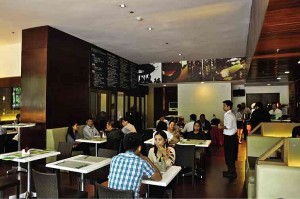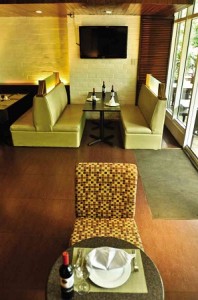How do you turn a heritage brand like Mario’s restaurant into a hip, modern dining place? The answer: Find people who will reinvigorate the timeless brand and stamp their own brand of innovation.
The original Mario’s restaurant has been around since 1971. It was the place to go to in Baguio City where it all started.
Mario’s Kitchen is an offshoot of the popular Mario’s restaurant chain famed for its Spanish cuisine.
In 2007, Gweilo Corp. acquired the Mario’s Kitchen franchise from the Benitez family. It was a giant leap for the Gweilo Corp., which also owns and operates Gweilo’s bar and restaurant.

MARIO’S Kitchen caters to a diverse crowd. During weekends, families troop to the restaurant while on weekdays, yuppies dine with friends.
Its goal: To restructure and re-launch the heritage brand with a modern twist.
In 2010, Gweilo Corp. reopened Mario’s Kitchen in Makati City. Culinary experts had set a different spin to the menu but retained the original taste and flavor.
Luis Banson Jr., a director of Gweilo Corp., used to go to Mario’s restaurant in Baguio when he was still a kid. He fondly remembers the familiar smell and taste of the food being served at the establishment.
Little did he know back then that he and his friends later in life would find themselves hard at work keeping the traditional taste of Mario’s restaurant while moving it forward in an ever-changing landscape that marks the local bar and restaurant scene.
The 31-year-old Banson and Gweilo Corp. bought all the recipes from the original owners and were also allowed to keep the name as well as the iconic pine tree logo.
Banson, together with the de Castro siblings—Raul, Ruby, Mario and Caress—along with other friends, reopened Mario’s Kitchen near the then newly renovated Gweilos bar in Makati.
Banson says that the initial challenge of having a heritage brand in their hands was to keep it alive.
“We wanted to modernize the restaurant, but we also want to keep its rich history,” he says.
Gweilo Corp. is made up of young individuals who all have day jobs aside from managing Mario’s Kitchen and Gweilo restaurants.
Although they still have a lot on their plate, Banson considers the restaurant chain as a reinvigorating break from his usual nine-to-five schedule.
In 2011, sales of Mario’s Kitchen started to pick up. Together with the Gweilo franchise, the company posted a profit of P5 million by the end of the year.
That same year, Gweilo Corp. started to look into the franchising market. The company was able to spin off a franchise of Gweilos Bar and Restaurant scheduled to open late this year.
The company also got the Securities and Exchange Commission’s approval to increase its capitalization to P100 million.
Gweilo Corp. then took a serious look at franchising as a means to perpetuate the heritage of Mario’s Kitchen.
The owners also sought to change the company’s main purpose from just operating bars and restaurants to include franchising, which the SEC approved in November of 2012.
“We expect a lot from our franchisers. We are looking for family type investors since Mario’s Kitchen started out as a family business. Or it could be a group of friends, a bunch of thirty-somethings who are looking for something on the side. Something that they call their own,” Banson says.
Managerial controls have been put in place to ensure that franchisers won’t go rogue, and that the high standards and rich history of Mario’s Kitchen will be upheld.
“We have devised a mold for our franchisers. The formula for this mold was completed last July 19. It covers everything from the layout design of the logo to the menu and the quality of service,” he explains.
The advantage of acquiring a heritage brand is that you don’t have to start from scratch, Banson says.
“It is a strong brand, so we were tasked to take care of the brand and hold true to its rich history,” he adds.
The 150-square-meter branch in Makati has been frequented not only for its Spanish delights but also for the sports bar.
“I think we have the cheapest beer in town. We sell it for P45 a bottle,” he says.
Surprisingly, one of their bestsellers is the dish of fried peanuts along with the salad, paella valencia, paella negra, lengua and callos.
Following the success of its Makati branch, Gweillo Corp. extended its reach to Ortigas Center in Pasig City earlier this year.
Banson says that during weekends, families troop to their restaurant. But on weekdays, the crowd becomes more diverse as yuppies who just got out of work dine and drink at Mario’s Kitchen.
By December, the company is looking at opening another branch of Mario’s Kitchen and a commissary at Bonifacio Global City.
This is Banson’s first venture into the food business and, so far, he says that he is enjoying it.
Having a heritage brand seems to make the task less daunting because he, along with his friends, is setting up a business with a rich history.
Also, it has its own reins in place. All it needs is a little tweaking and a lot of innovative ideas to make the brand more relevant today, he explains.
“All you really need to do is fine-tune the process,” he adds.
Another dimension to Mario’s Kitchen is its advocacy: Feeding Metro Manila (FMM) is a nonprofit organization designed to curb hunger issues in the Philippines.
Together with dzMM and ABS-CBN, they feed 50 to 6,000 people from Metro Manila up to Batangas City.
“All the food is prepared by Mario’s Kitchen, delivered by our own trucks. And all the staff, as well as the directors, are present during the feeding program,” he says.
The poor are treated to meals of arroz caldo and paella.
As part of its expansion plans, Gweilo Corp. is working with Francorp Philippines to make Mario’s Kitchen available for franchising.
They are part of Franchise Asia Philippines 2013 which will culminate today.
In the next five years, Banson envisions Mario’s Kitchen to go nationwide, as they plan to establish branches in Davao and Cebu.
Mario’s Kitchen is on C. Palanca Street, Legaspi Village, Makati City and on P. Guevarra Street, Pasig City. Gweilo Corp. also operates Daddy O’s, a tea house on P. Guevarra Street in San Juan, and Grab & Go.



